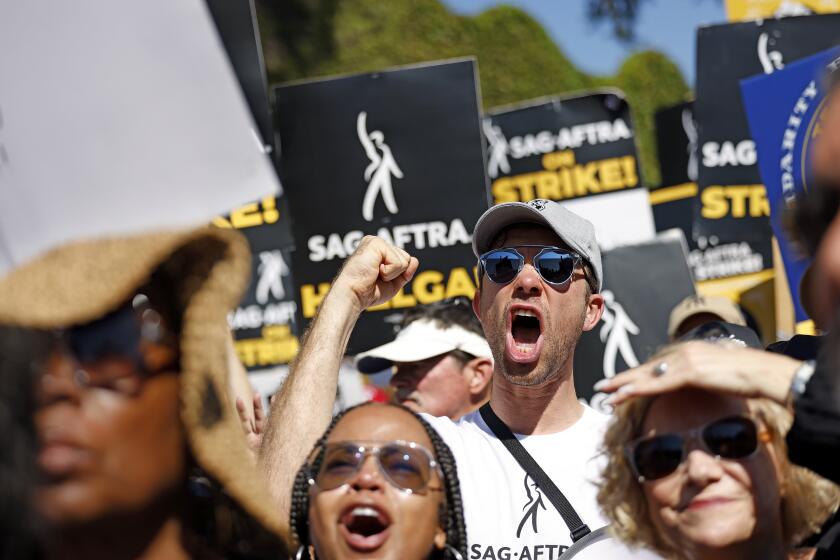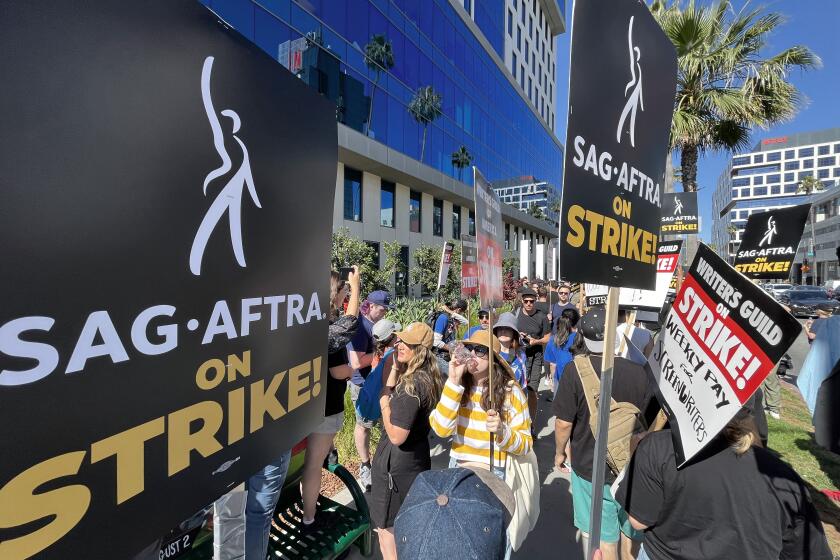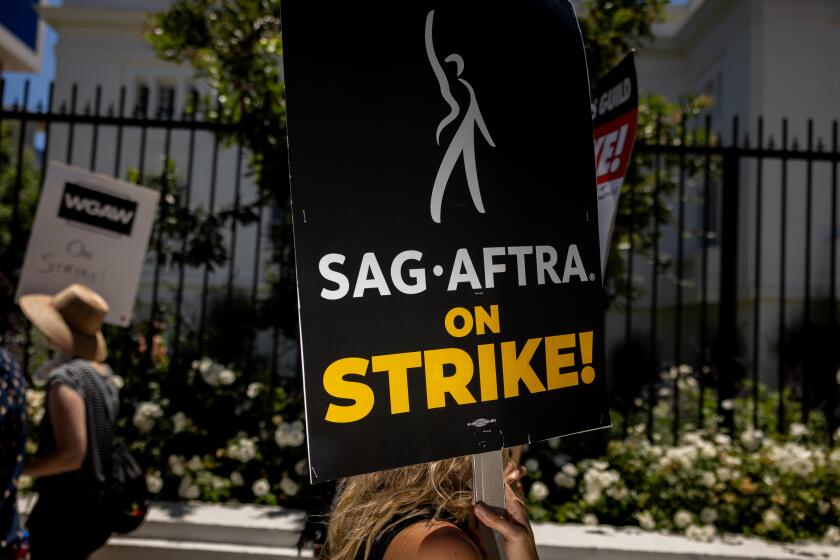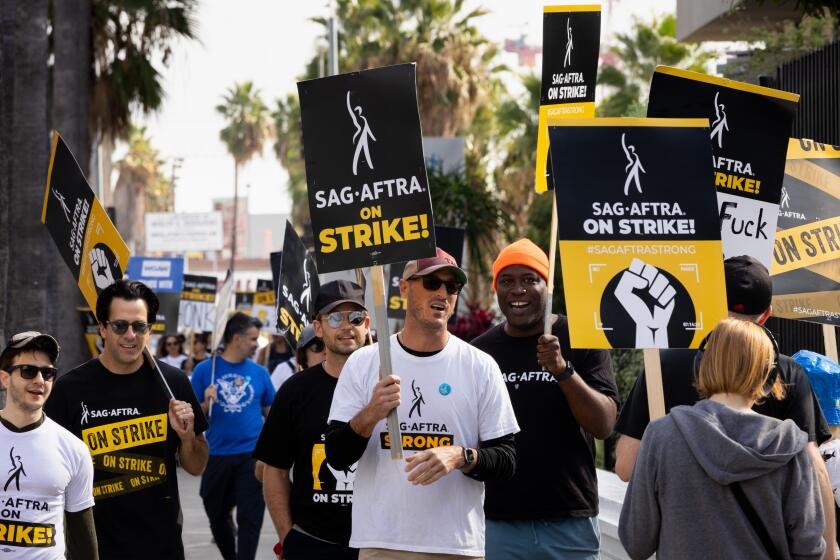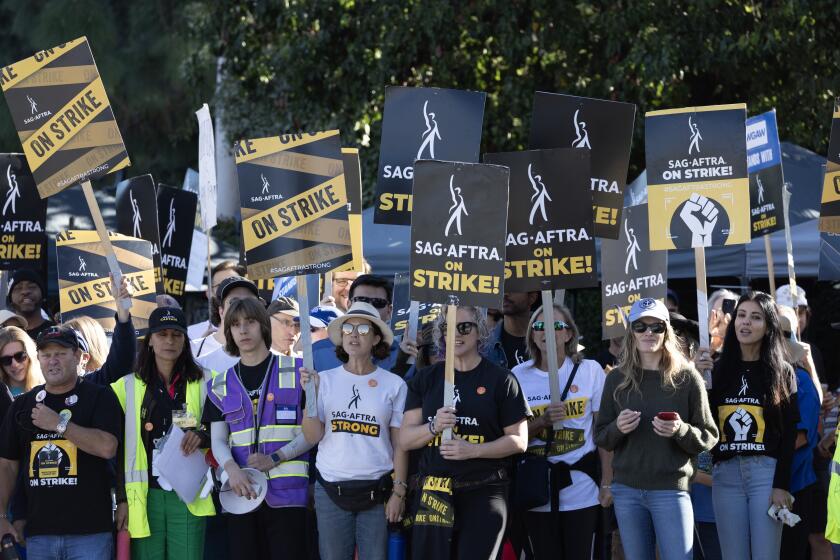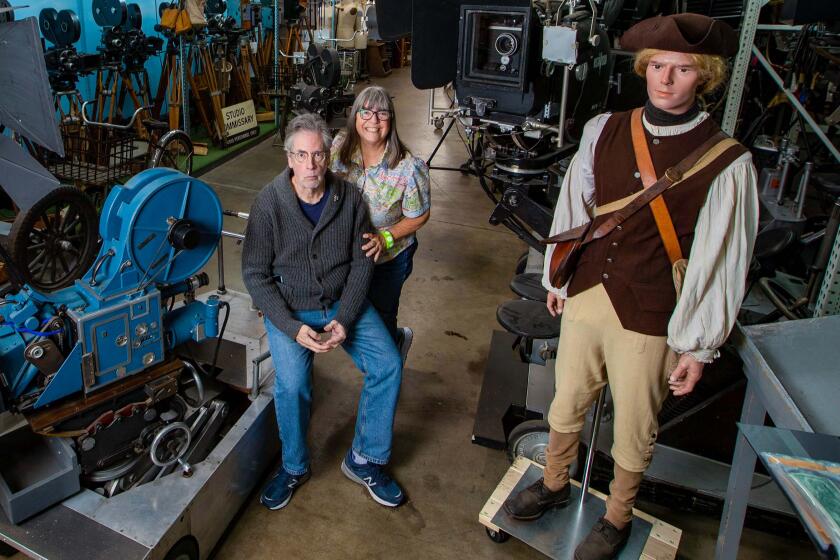One pandemic and two strikes later, what will become of the movie industry?
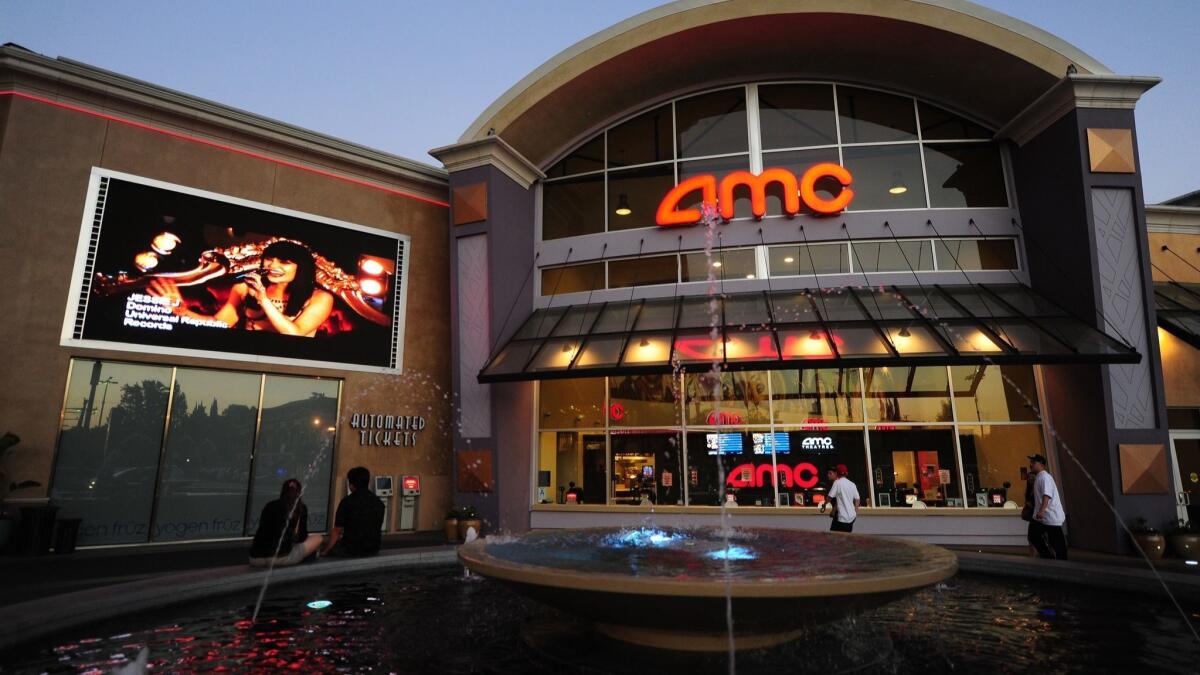
- Share via
The movie industry was still recovering from the COVID-19 pandemic when two of the most essential parts of the Hollywood machine — writers and actors — went on twin strikes.
The dual walkouts, which hampered development and halted production on the vast majority of films and TV shows in the works at big studios, dealt another blow to theater chains still fighting to return to pre-pandemic levels of business.
Production is poised to resume after the Screen Actors Guild-American Federation of Television and Radio Artists on Wednesday declared the end of the actors’ strike, which saw the union gain higher wages, improved benefits and protections related to artificial intelligence for its members.
But the movie business is still reeling from the effects of the work stoppages by both actors and members of the Writers Guild of America (the writers reached a deal and ended their walkout in September) and will need some time to recover. Some studio executives speculate that it may take until 2026 or 2027 for the industry to fully rebound to pre-pandemic levels.
“It’s something that won’t honestly be felt until probably next spring and in the summer as well, because obviously, these [work stoppages] hurt the future of filmgoing and the business of moviemaking,” said Jeff Bock, senior media analyst at Exhibitor Relations Co. “Obviously, if it was drawn out another couple months, we could be looking at an entirely different summer of 2024 — something that nobody wanted.”
If approved by union members, the tentative contract would end a strike that lasted nearly four months and shut down Hollywood film and TV productions.
However, even if the domestic box office eventually rebounds to what it was before the global health crisis — hovering around $11 billion per year — that doesn’t mean theater attendance will be back to pre-COVID normal.
While ticket prices have been rising due to inflation, foot traffic has been steadily falling. Theater attendance, which has steadily declined over the last decade, is down 27% this year compared to 2019, said one distribution executive who was not authorized to speak publicly.
That’s a problem for exhibitors, who depend on moviegoers not only to purchase tickets but also to spend money on popcorn, soft drinks, candy and other concessions in order to pay the bills.
At least in the short term, the fallout from the Hollywood strikes could exacerbate this issue.
Writers’ and especially actors’ ineligibility to work for companies repped by the Alliance of Motion Picture and Television Producers during the strike has caused widespread production delays.
Several studios have pushed their 2024 releases to 2025 or removed them from the calendar altogether, sparking concern among distributors and exhibitors about voids in next year’s film slate.
Actors react to SAG-AFTRA strike ending: ‘We worked hard ... didn’t cave ... got the deal we needed’
As SAG-AFTRA announced that it has reached a tentative deal with the AMPTP studios, long-striking actors react online to the historic deal.
“It’s like any other business,” said Paul Dergarabedian, senior media analyst at measurement firm Comscore. “If you’re selling cars, and normally you would have a thousand of them on your lot, and now you have 200, that’s a very different business.”
In a third-quarter earnings report released hours before the actors’ strike was suspended Wednesday, AMC Theatres Chief Executive Adam Aron urged SAG-AFTRA and the AMPTP to reach an agreement “immediately” to help offset the “collateral damage from these lengthy work stoppages.”
“The short-term impacts of the Writer’s and Actor’s strikes will cause additional and needless challenges for AMC in 2024,” Aron said. “For the benefit of all involved in the movie ecosystem, this months-long disharmony needs to come to an end now.”
Among the 2024 titles bumped during the strikes to the following year are the eighth installment in Paramount’s “Mission: Impossible” franchise (moved to May 2025 from June 2024), Disney’s live-action remake of “Snow White” (postponed to March 2025 from March 2024) and Lionsgate’s sequel to “Dirty Dancing” (pushed to summer 2025 from February 2024), according to Comscore.
Other features originally set for next year — including the latest installment in Sony’s “Spider-Verse” saga and various mystery projects from Disney and Warner Bros. — have simply been pulled from the schedule.
SAG-AFTRA has approved a deal from the studios to end its historic strike. The actors were on strike for more than 100 days.
The relocation of highly anticipated pictures, such as “Mission: Impossible 8” and “Snow White,” to 2025 from 2024 could spell “danger signs ahead” for the new year, said the studio distribution executive.
If too many 2024 releases are deferred (at least a dozen so far), the 2025 film slate is “going to be jammed up,” the executive noted, with the major studios competing for prime slots and releasing movies “on top of each other.”
Chris Aronson, president of theatrical distribution at Paramount, was more optimistic, citing the success of recent theatrical events such as “Barbenheimer” and Taylor Swift’s “The Eras Tour” and “compelling product on the calendar” for next year.
“I think as long as there’s some continuous flow of new product that the exhibition sector will be fine,” Aronson said. “It’s not like when COVID shut the business down and there was no new film to speak of.”
By forcing the writers’ and actors’ strikes, the studios cost the California economy more than $5 billion and caused untold anguish. Those wounds won’t heal overnight.
While Dergarabedian stressed that the power of runaway breakout hits — such as “Barbie,” “Oppenheimer” and “Sound of Freedom,” which have helped propel this year’s domestic box office total to more than $9 billion (the highest number since 2019) — is not to be discounted, ultimately, it’s a robust film slate that exhibitors long for.
“Last summer, we had ‘Top Gun: Maverick,’ and next summer, some other phenomenon could occur. Everybody will get ... back up. It’s just a major, major slowdown that’s happened.”
SAG-AFTRA’s negotiating committee and the major Hollywood studios have reached a tentative deal to end the 118-day actors’ strike. So what happens now?
A handful of 2023 titles have been affected as well — particularly pictures with star-studded casts that weren’t allowed to promote their movies during the work stoppage.
Warner Bros.’ “Dune: Part Two,” starring Zendaya and Timothée Chalamet, was rescheduled to March 2024 from November 2023; MGM’s “Challengers,” also starring Zendaya, was pushed to April 2024 from September 2023; and Sony’s “Kraven the Hunter,” starring Aaron Taylor-Johnson, Russell Crowe and Ariana DeBose, was bumped to August 2024 from October 2023, per Comscore.
Other high-profile 2023 releases — from Paramount’s “Teenage Mutant Ninja Turtles: Mutant Mayhem” and Disney’s “A Haunting in Venice” to Sony’s “Dumb Money” and Warner Bros.’ “Blue Beetle” — forged ahead without promotional support from their stars.
“You’re leaving something on the table by not having the ability to do the publicity push that you would normally do,” Aronson said. “And [with] ‘Killers of the Flower Moon,’ imagine having one of the biggest — if not the biggest movie star in the world — [Leonardo DiCaprio] not available to promote the movie. That’s hard.”
Dergarabedian noted that there are still some major upcoming releases — with A-list casts that can now promote them — that could serve to cushion the domestic box office before the year is out.
Warner Bros.’ “The Color Purple,” starring Taraji P. Henson, Fantasia Barrino and “The Little Mermaid” breakout Halle Bailey, opens Dec. 25; Beyoncé’s “Renaissance” concert film comes out Dec. 1; and Warner Bros.’ “Wonka,” starring Chalamet, is due Dec. 15 — to name a few.
“I will not cave,” “The Nanny” star and SAG-AFTRA President Fran Drescher says in an interview, as the actors’ strike reaches 100 days. Talks with the major studios were suspended earlier this month.
“I’m actually really bullish on ... how the rest of the year will perform,” Dergarabedian said. “But we need to keep that momentum going into next year.”
Various hit TV series — from HBO’s “True Detective” and Netflix’s “Stranger Things” to Disney+’s “Echo” and Paramount Network’s “Yellowstone” — have also experienced delays because of the work stoppages.
The imminent restart of production will certainly help on that front, but “once that green light happens, there’s going to be a bit of a scramble,” Aronson predicted, when it comes to assembling crews, booking talent and getting things up and running again.
Workers in film and TV, most of whom are pro-union, have been trying to make ends meet amid a dual strike of Hollywood actors and writers.
“Everyone’s going to have to work together ... to solve the Rubik’s cube,” he said. “It may take a little bit of time, but it’ll get done.”
Last week, the studios were optimistic and SAG-AFTRA was ‘cautiously optimistic’ that the actors’ strike could be resolved soon. Why hasn’t it ended?
Further complicating matters is the approach of the holiday season, which under normal circumstances would be a slow production period for Los Angeles. But the opposite could be true this year, depending on how quickly people can regroup and get back to work, said Philip Sokoloski, spokesperson for FilmLA, the nonprofit group that handles film permits for the region.
“That may not be realistically possible, given the availability of folks and the number of weeks it can take to get a new TV series online, for example,” Sokoloski added.
Sokoloski’s primary concern is the well-being of the vendors — such as prop houses, florists and caterers — that supply productions with the tools and nourishment they need to function. Those small, local businesses have taken a huge hit over the last seven months, and many are now operating with reduced staffs.
“Will those businesses be able to spool up quickly enough to supply the production at the level it needs coming out of this?” Sokoloski said. “I would hope so. But I’m not confident they can do so given the economic realities they’ve been facing.”
As productions shut down due to the writers’ strike, local prop houses, florists and caterers worry about their future and loss of work, as their business costs continue to rise.
More to Read
Inside the business of entertainment
The Wide Shot brings you news, analysis and insights on everything from streaming wars to production — and what it all means for the future.
You may occasionally receive promotional content from the Los Angeles Times.
